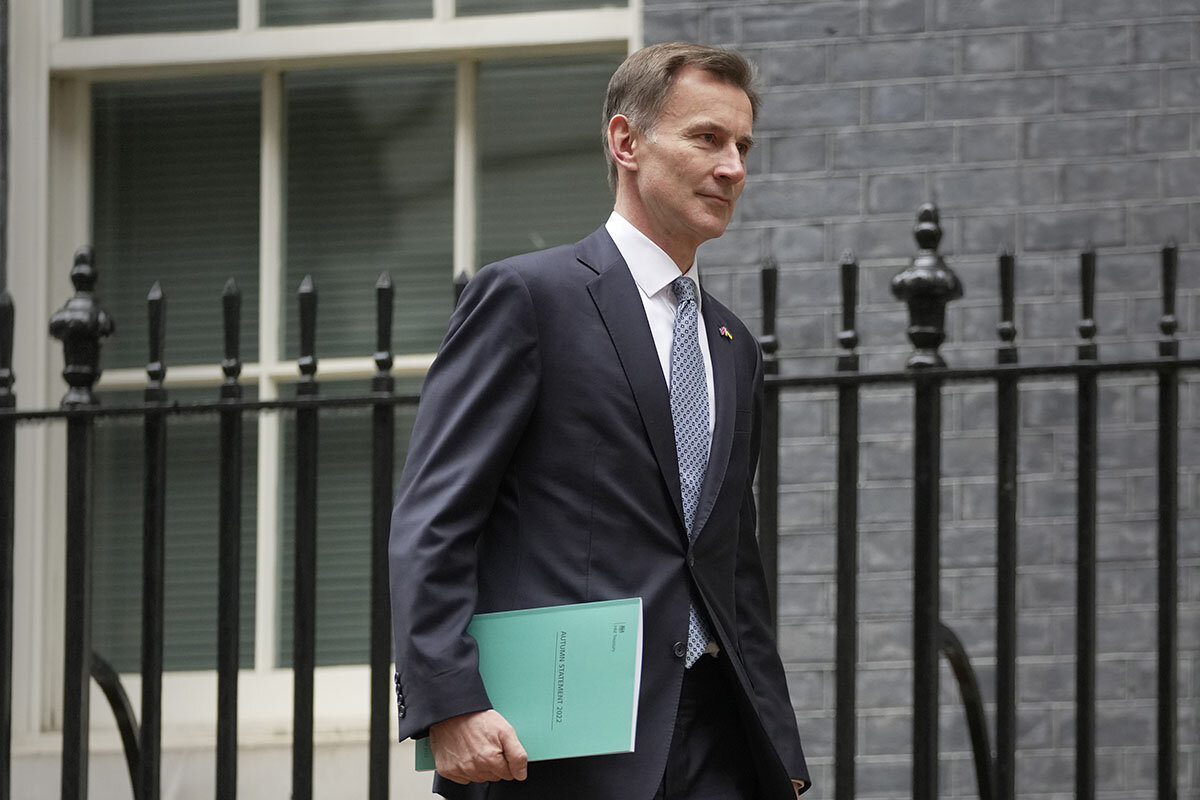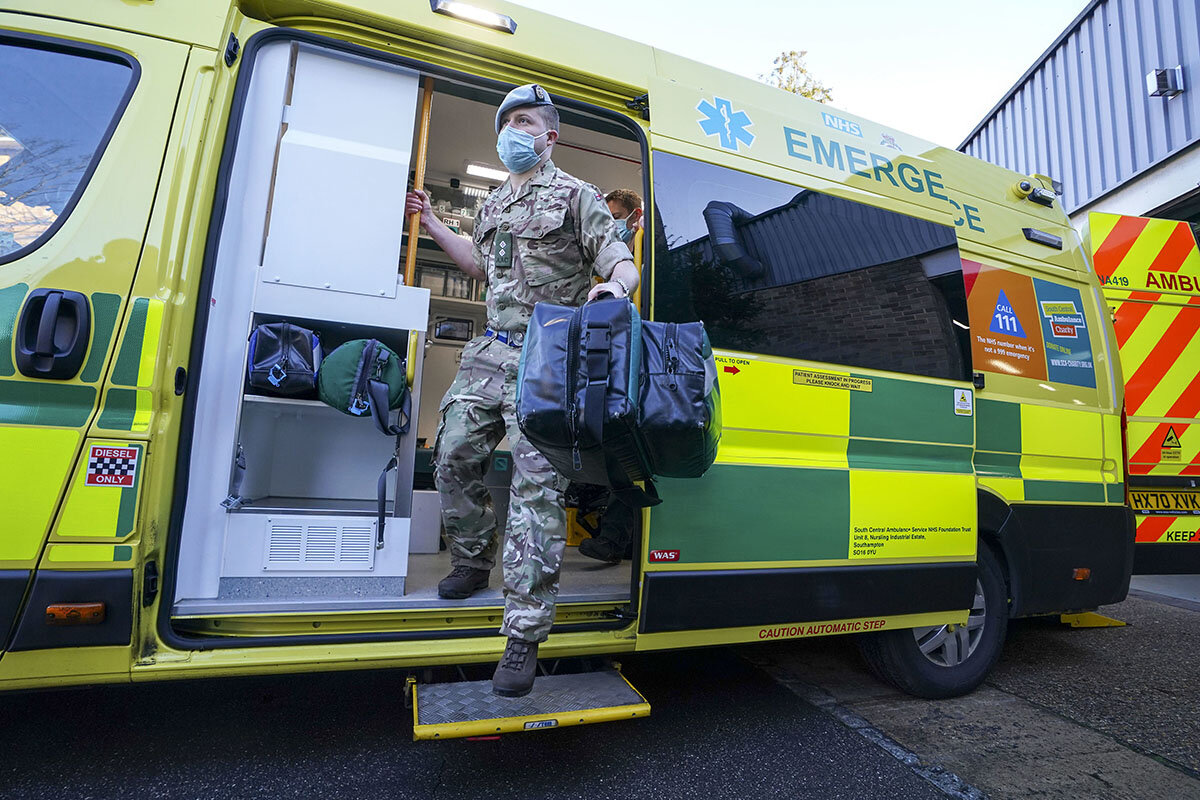UK’s National Health Service is beloved. And now, it’s fraying.
Loading...
| Brighton and Hove, England
They call in at all hours of the day and night. The man who said he wouldn’t be able to play with his children if it hadn’t been for an operation. The woman who’s thankful for a front-line worker who offered aid and support amid a family crisis. A 10-year-old who underwent surgery after the pandemic.
This is Hopeline19, a free phone line, which began as a way for the grateful British public to leave messages of support for Britain’s National Health Service (NHS) workers. Within days of its launch in September 2021, some 17,000 people had called in to the service. Today, 18 months later, 6,000 people still call in each week.
“I don’t know if you’re hearing this on your 10-minute break, or the only break you’ve had from a 12-hour shift, but I want to thank you from the bottom of my heart,” said one caller.
Why We Wrote This
A story focused onThe British people rely upon the National Health Service like no other institution. With the NHS “on the brink of collapse,” the country is fretting over the future of its long-trusted safety net.
The NHS is the country’s pride and joy, more beloved by the public than any other British institution, including the royal family, the armed forces, and the BBC, because of the safety and security it provides to all without precondition. But it is facing a crisis like never before – with trust waning in its ability to support both its workers and the public effectively. The health care system is being pushed beyond its capacity, creating record delays in emergency services and raising the number of excess deaths nationally to higher than it was during the pandemic.
At the same time, NHS doctors, nurses, and front-line workers feel so overworked, underpaid, and undervalued by the government that pays them that they are taking to the picket lines in ways never before seen in Britain. As they do, they are receiving the support of a public that wants to protect those who provide such a critical social safety net.
This has drawn new attention to a fact that Chancellor Jeremy Hunt acknowledged last month: “The NHS is on the brink of collapse ... with doctors, nurses on the front line frankly under unbearable pressure,” he said.
“The NHS,” says Alastair McLellan, editor of Health Service Journal, “has reached the point where it can no longer save your life.”
Britain’s favorite public institution
The NHS came into existence on July 5, 1948. It was the first universal health care system to be financed by taxes, and is “free at the point of delivery,” meaning that treatment is provided according to need, not by a person’s ability to pay. The service has outlasted two monarchs, 15 prime ministers, and 29 health secretaries.
But spending on health care has faltered in Britain over the last decade. The United Kingdom invests around 0.3% of gross domestic product on health care capital spending, less than any other country in the G-7. This is now reflected in the worsening health of British people, which is holding back economic growth for the first time since the Industrial Revolution, former Bank of England chief economist Andy Haldane said in a recent speech.
Today, the NHS situation is stark. A record 7.21 million people were waiting for treatment in England at the end of October. Around 4,000 patients a day are spending more than 12 hours in emergency departments, a record high that far exceeds the target of four hours. Most alarmingly, figures from the Office of National Statistics show that, on average, the number of excess deaths is currently higher than it was during the pandemic, with a quarter of those attributed to the disruption of emergency care.
There are two key problems, says Mr. McLellan, and one of them has nothing to do with treatment. Rather, it’s logistical.
Patients are getting stuck in emergency departments (called “accident and emergency,” or A&E, in the U.K.) rather than being transferred to hospital beds because wards are occupied by people medically fit enough to leave, but who cannot be discharged because they lack the necessary care at home. As much as a third of beds in some institutions are occupied by people in this situation.
“If you can’t get people out of hospital, then you can’t get people out of A&E,” says Mr. McLellan. “If you can’t get people out of A&E, you can’t get them out of the ambulance queuing outside A&E. And if an ambulance is queuing outside A&E, it’s not responding to life-threatening calls.”
The second, extremely urgent, problem is staff shortages, exacerbated by the departure, post-Brexit, of thousands of foreign-born health professionals, including 4,000 European doctors.
Many of the remaining hospital staffers have taken to skipping breaks and working overtime for free, so as to maintain care standards, and selling annual leave to make ends meet, or resorting to food banks.
Such stress has taken its toll: In the year leading up to last June, 1 in 9 nurses quit the NHS, and a Royal College of Nursing (RCN) survey found that 6 in 10 were contemplating or planning their resignations. Already, more than 30,000 nursing positions remain unfilled.
At a time when the country is still feeling the impacts of COVID-19, and suffering a cost-of-living crisis, a recession, and an energy crisis, the NHS is under more pressure than at any other time in its history, says Siva Anandaciva, chief analyst at The King’s Fund, a charitable organization that works to improve health and care in England.
“We’ve run our system on what I’d say is the red zone on the dial for a long, long time,” he says. “Over the last 10 years in this country, we’ve not tried to grow our workforce at the rate we needed to and we’ve not invested in the basic facilities you need for modern health care.”
“As a result, you’ve basically got a system that hasn’t got enough resilience to cope with shocks. When you get multiple shocks, it’s no wonder that waiting times and patient care are at the poor level they’re at now.”
Pushing back against the government
For the first time in its 106-year history, the RCN called a strike this month, demanding a pay rise. Nurses walked out for two days, and strikes will continue into the spring if they fail to reach an agreement. The action was supported by 59% of Britons, a recent poll found.
“Anger has become action, our members are saying enough is enough,” RCN General Secretary Pat Cullen said in a statement. “Our members will no longer tolerate a financial knife-edge at home and a raw deal at work.”
Ambulance workers also struck for 24 hours on Wednesday.
While the strikes primarily have to do with pay, front-line workers also cite underfunding and staff shortages that they say create working conditions that leave them with no choice but to strike. A recent survey by the GMB trade union found that 1 in 3 ambulance staffers had been involved in a delay that had resulted in a patient’s death.
“We’ve got higher levels of PTSD in our nursing staff than recent returns from combat zones,” says Claire Goodwin-Fee, founder and CEO of Frontline19, a service that set up Hopeline19 and provides psychological support to front-line workers.
Regardless of how things stand at the moment, Britons are near-unanimous in their desire to see the NHS survive and – eventually – thrive.
“Generally speaking, the public on the street are huge fans of the NHS and supporters of health workers, which we saw during the pandemic,” says Ms. Goodwin-Fee. “I’ve never come across anybody who wants to get rid of it.”







